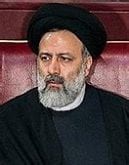RFL/RE – The head of Iran’s Islamic Revolutionary Guards Corps has rejected a plea from Iranian activists to broach talks with the United States to resolve longtime differences, saying they have “sided with the U.S., the enemy of the people.”
“Striking an understanding with the United States means the death of the Islamic republic,” General Mohammad Ali Jafari was quoted as saying by the ISNA news agency on June 19.
Over the weekend, more than 100 activists in moderate and reformist camps in Iranian politics welcomed U.S. President Donald Trump’s deal with North Korean leader Kim Jong Un to work toward the complete denuclearization of the Korean Peninsula.
In a statement published by Iranian media, the activists, who were mostly foreign-based, urged Tehran to start direct negotiations with Washington “with no preconditions” to resolve decades of enmity between the two countries dating to Iran’s 1979 Islamic Revolution.
A signatory of the letter, Gholamhossein Karbaschi, who heads a reformist party, told the Etemad pro-reform newspaper that Iran should say it is “ready to negotiate” if “the United States and Trump give assurances that they will never again renege on their commitments.”
Also among the signatories was Abdolali Bazargan, a son of Iran’s first Prime Minister Mehdi Bazargan, the paper said.
But Jafari dismissed the idea, saying that activists who favor fresh talks with Trump, who withdrew the United States from Iran’s nuclear deal with world powers in May, are “traitors and antirevolutionaries.”
“While we are not saying that it amounts to treason, we must say that it opens the way to making concessions to the enemy,” he said.
Jafari said the 2015 negotiations with the United States and other world powers on the nuclear deal were “an exception.”
Iranian government spokesman Mohammad Bagher Nobakht echoed Jafari’s remarks.
“There are no grounds or logic to talk to such a person [as Trump]. Public opinion would not welcome that either,” Nobakht was quoted as saying by ISNA.
Jafari also said on June 19 that Iran has no plan to increase the range of its ballistic missiles, which currently are designed to travel as far as 2,000 kilometers.
“We have the scientific ability to increase our missile ranges, but it is not our current policy,” Jafari was quoted as saying by Iran’s semiofficial Tasnim news agency.
Jafari said most of Iran’s enemies are already situated within a 2,000-kilometer radius. The range encompasses much of the Middle East, including Saudi Arabia, Israel, and American bases in the Persian Gulf region.
Iran says its ballistic-missile program is only for defensive purposes against regional adversaries.
In 2017, Iran’s Supreme Leader Ayatollah Ali Khamenei ordered limits on the country’s ballistic-missile program to 2,000 kilometers.
With reporting by AP, Reuters, dpa, and AFP
 Shabtabnews In this dark night, I have lost my way – Arise from a corner, oh you the star of guidance.
Shabtabnews In this dark night, I have lost my way – Arise from a corner, oh you the star of guidance.


